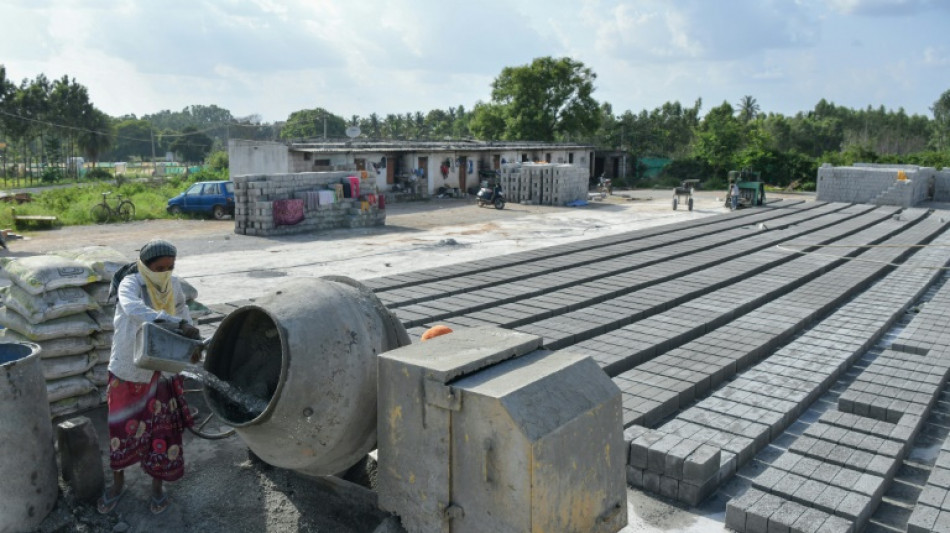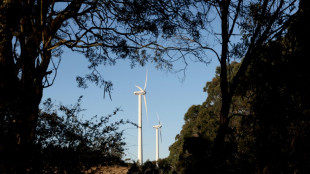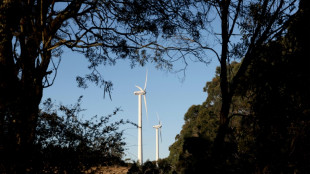
-
 Iran, US hold new round of high-stakes nuclear talks
Iran, US hold new round of high-stakes nuclear talks
-
Up at dawn for front-row seat to history at Francis's funeral

-
 Pakistan ready to 'defend sovereignty' after India threats
Pakistan ready to 'defend sovereignty' after India threats
-
Huge crowds flock to Vatican for Pope Francis's funeral

-
 Xi says China must 'overcome' AI chip challenges
Xi says China must 'overcome' AI chip challenges
-
Indian army says new exchange of gunfire with Pakistan

-
 Epstein accuser Virginia Giuffre takes own life in Australia: family
Epstein accuser Virginia Giuffre takes own life in Australia: family
-
Hundreds of buildings damaged, dozens injured in 6.3 Ecuador quake

-
 India and Pakistan's Kashmir fallout hits economy too
India and Pakistan's Kashmir fallout hits economy too
-
Francis's funeral to be grand farewell to 'pope of the poor'

-
 Pogacar faces defiant Evenepoel at Liege-Bastogne-Liege
Pogacar faces defiant Evenepoel at Liege-Bastogne-Liege
-
Chelsea eye great escape against Barcelona in Women's Champions League

-
 Iran, US to hold new round of high-level nuclear talks
Iran, US to hold new round of high-level nuclear talks
-
'Energy and effort' pay off for Reds as Blues' woes continue

-
 Albatross and closing birdie lift China's Liu to LPGA Chevron lead
Albatross and closing birdie lift China's Liu to LPGA Chevron lead
-
On the horizon? Wave of momentum for high seas treaty

-
 Top Mistakes to Avoid When Building Credit History
Top Mistakes to Avoid When Building Credit History
-
Developing countries should fast-track US trade deals: World Bank president

-
 Grizzlies' Morant 'doubtful' for must-win game 4 v Thunder
Grizzlies' Morant 'doubtful' for must-win game 4 v Thunder
-
Trump in Rome for pope funeral in first foreign trip of new term

-
 Trump says Russia-Ukraine deal 'very close' after new Kremlin talks
Trump says Russia-Ukraine deal 'very close' after new Kremlin talks
-
US rookies lead PGA pairs event with McIlroy and Lowry in hunt

-
 Trump tariff promises get a reality check
Trump tariff promises get a reality check
-
Warriors coach Kerr 'relatively optimistic' injured Butler will play game 3

-
 Postecoglou hopes 'Stonecutter's Credo' can inspire Spurs
Postecoglou hopes 'Stonecutter's Credo' can inspire Spurs
-
PSG lose unbeaten Ligue 1 record ahead of Arsenal showdown

-
 Venezuela accuses El Salvador president of 'human trafficking'
Venezuela accuses El Salvador president of 'human trafficking'
-
Own goal takes Sundowns to African final against Pyramids

-
 Scores of buildings damaged, 20 injured in Ecuador quake
Scores of buildings damaged, 20 injured in Ecuador quake
-
US stocks extend rally as market eyes busy calendar next week

-
 Pope's death triggers surge of disinformation he fought against
Pope's death triggers surge of disinformation he fought against
-
Rovanpera takes control of Rally Islas Canarias

-
 Zelensky insists Crimea is Ukrainian as US envoy meets Putin
Zelensky insists Crimea is Ukrainian as US envoy meets Putin
-
Patel and Mendis help Sunrisers beat Kings in Dhoni's 400th T20

-
 Copa del Rey ref statements 'unacceptable': Real Madrid after boycotting final build-up
Copa del Rey ref statements 'unacceptable': Real Madrid after boycotting final build-up
-
Insurance CEO's accused killer pleads not guilty to federal murder charges

-
 FBI arrests Wisconsin judge for shielding undocumented migrant
FBI arrests Wisconsin judge for shielding undocumented migrant
-
Brazil ex-president Collor de Mello jailed for corruption

-
 Zelensky insists Crimea 'belongs' to Ukraine as US envoy meets Putin
Zelensky insists Crimea 'belongs' to Ukraine as US envoy meets Putin
-
Real Madrid boycott Copa del Rey build-up over referee complaints

-
 Trinidad and Tobago votes for parliament, PM, with opposition in lead
Trinidad and Tobago votes for parliament, PM, with opposition in lead
-
IMF chief hails 'constructive' Spring Meetings held under tariff uncertainty

-
 Iran FM Araghchi in Oman ahead of nuclear talks with US
Iran FM Araghchi in Oman ahead of nuclear talks with US
-
Dozens of buildings destroyed, 20 injured in Ecuador quake

-
 Young Barca must 'enjoy' Real Madrid Copa final fight: Flick
Young Barca must 'enjoy' Real Madrid Copa final fight: Flick
-
Pakistan and India border closure separates families

-
 Brazil's Bolsonaro 'stable' after post-surgery setback
Brazil's Bolsonaro 'stable' after post-surgery setback
-
Catholics in secular Cuba hail Francis as 'bridge'

-
 US envoy Witkoff, Putin discuss 'possibility' of direct Russia-Ukraine talks
US envoy Witkoff, Putin discuss 'possibility' of direct Russia-Ukraine talks
-
Community seeks answers after French school knife killing


Scientists say they can make zero-emission cement
Researchers on Wednesday said they were a step closer to solving one of the trickiest problems in tackling climate change -- how to keep making cement despite its enormous carbon footprint.
In a world first, engineers from Britain's University of Cambridge have shown that cement can be recycled without the same steep cost to the environment as making it from scratch.
Cement binds concrete together but the whitish powder is highly carbon-intensive to produce, with the sector generating more than triple the emissions of global air travel.
Demand for concrete -- already the most widely used construction material on Earth -- is soaring, but the notoriously polluting industry has struggled to produce it in a less harmful way to the climate.
The team at Cambridge believes it has a solution, pioneering a method that tweaks an existing process for steel manufacturing to produce recycled cement without the associated CO2 pollution.
This discovery, published in the journal Nature, could provoke "an absolutely massive change" by providing low-cost and low-emission cement at scale, said Julian Allwood, who co-authored the research.
"It is an extremely exciting project... I think it's going to have a huge impact," said Allwood, an expert on industrial emissions and key contributor to reports from the UN's scientific panel on climate change.
To produce cement, the basic ingredient in concrete, limestone must be fired in kilns at very high temperatures usually achieved by burning fossil fuels like coal.
On top of that, limestone produces significant additional CO2 when heated.
- 'Bright hope' -
The cement industry alone accounts for nearly eight percent of human-caused CO2 emissions -- more than any country except China and the United States.
Some 14 billion cubic metres of concrete are cast every year, according to industry figures, and more still will be needed as economies and cities grow in future.
The International Energy Agency says that if emissions from the cement industry continue to increase, a pledge of carbon neutrality by 2050 will almost certainly remain out of reach.
Many efforts to produce low-carbon or so-called "green cement" are too expensive or difficult to deploy at scale, rely on unproven technologies, or don't come near zero emissions.
The Cambridge researchers approached the problem by looking at an industry that was already well established -- steel recycling, which uses electric-powered furnaces to produce the alloy.
They substituted a key ingredient in that process with old cement sourced from demolished buildings, Allwood said.
Instead of waste being produced, the end result was recycled cement ready for use in concrete, bypassing the emissions-heavy process of superheating limestone in kilns.
This method -- which has a patent pending -- was "a very low disruption innovation" requiring little change or additional cost on the part of business, Allwood said.
If powered by renewable energy, he said, these furnaces could hope to produce zero-emission concrete at scale.
"Once the electricity has no emissions, then our process would have no emissions," Allwood said.
Countries could not hope to bring CO2 emissions to zero by 2050 -- the key pledge of the Paris climate agreement -- using concrete as it exists today, he added.
"This is the big bright hope, I think," Allwood said.
Y.Aukaiv--AMWN



